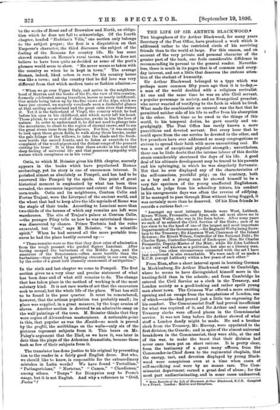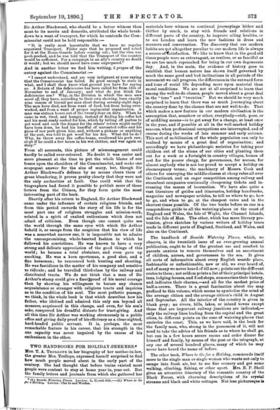THE LIFE OF SIR ARTHUR BLA.CKWOOD.* THE biographers of Sir
Arthur Blackwood, for many years Secretary of the Post Office, have produced a work which is addressed rather to the restricted circle of his surviving friends than to the world at large. For this reason, and on account of the very private and personal character of the greater part of the book, one feels considerable diffidence in recommending its perusal to the general reader. Neverthe- less, there is much in its pages that is of common and every- day interest, and not a little that deserves the curious atten- tion of the student of humanity.
Sir Arthur Blackwood belonged to a type which was perhaps more common fifty years ago than it is to-day; a man of the world doubled with a religious revivalist, At one and the same time he was an able Civil servant, a popular personage in society, and an Evangelical preacher, who never wearied of testifying to the faith in which he lived. What made the combination so unusual was the fact that he permitted neither side of his life to suffer from his absorption
in the other. Such time as he owed to the things of this world, to his temporal duties, he gave exactly and un- grudgingly. The Post Office has rarely known a more punctilious and devoted servant. But every hour that he could spare from the one service he devoted to the other, and few preachers have ever addressed so many congregations or striven to spread their faith with more unremitting zeal. He was a man of exceptional physical strength ; nevertheless, there can be little doubt that the intense labour of this double strain considerably shortened the days of his life. A good deal of his ultimate development may be traced to his parents and his upbringing, in which he was singularly fortunate.
Not that he ever displayed any of the characteristics of the self-conscious, youthful prig ; on the contrary, both as a boy and a young man he showed himself to be a very fair specimen of the young unaffected Englishman. Indeed, to judge from his schoolboy letters, his conduct in his unregenerate days was often the reverse of edifying. If he managed to pass through Eton without being flogged, it was certainly more than he deserved. Of his Eton friends he records a curious fact :—
" Amongst my most intimate friends were West, Lubbock, Rivers Wilson, Fremantle, and Ryan, who sat next above me in school, and Welby, who was in the form below. After some years we each of us entered the Civil Service of the State ; each of us has risen to be the head of one of the largest and most important Departments of the Government,—Sir Reginald Welby being Secre- tary to the Treasury; Sir Algernon West, Chairman of the Inland Revenue ; Sir Rivers Wilson, Controller of the National Debt ; Sir Charles Ryan, Controller-General of Exchequer ; Hon. Sir Charles Fremantle, Deputy-Master of the Mint ; while Sir John Lubbock is not only well known as a politician, but also as a literary man.
One other circumstance connected with the set I have just mentioned is also remarkable. We were each of us made a B.C.B. (except Lubbock) within a few years of each other."
From Eton, after a short interval spent in learning German in Mecklenburg, Sir Arthur Blackwood went to Cambridge, where he seems to have distinguished himself more in the
hunting-field than in the schools ; and from Cambridge he entered the Civil Service as a clerk in the Treasury, and London society as a good-looking and rather spoilt young man about town. The Crimean War offered a more exciting opening and an escape from the temptations of London, one of which—cards—had proved just a little too engrossing for his comfort. The Commissariat Staff had proved insufficient for what was required of it, and Sir Arthur and some other
Treasury clerks were offered places in the Commissariat service. It was not long before Sir Arthur showed of what stuff a London dandy might be made. He and a brother clerk from the Treasury, Mr. Murray, were appointed to the
first division, the Guards; and in spite of the almost universal breakdown in the Commissariat, they were able, at the end
of the war, to make the boast that their division had never once been put on short rations. It is pretty clear, from the testimony of a great many officers, from the Commander-in-Chief down to the regimental chaplain, that the energy, tact, and devotion displayed by young Black-
wood were conspicious even at a time when cases of self-sacrificing zeal were by no means rare. The Com- missariat department earned a great deal of abuse ; for the most part undiscriminating, and in some cases undeserved.
• Some Records of the life of Stevenson Arthur Blackwood, K.C.B. Compiled by a Friend. London Hodder and Stoughton.
Sir Arthur Blackwood, who should be a better witness than most to its merits and demerits, attributed the whole break- down to a want of transport, for which he contends the Com-
missariat could not be held responsible :— " It is really most lamentable that we have no regular organised Transport. Filder says that he proposed and asked for it at the Horse-Guards before coming out ; but the idea was pooh-poohed, and he was told that the Transport of the country would be sufficient. For a campaign in an ally's country no doubt it would; but we should never have come unprepared."
And in another letter we find him writing, a propos of the -outcry against the Commissariat :- " I cannot understand, and am very indignant at your saying that the Commissariat has failed. Be good enough to state in what, and I shall then know what ground you have for saying so. A Return of the deficiencies has been called for from 15th of November to end of January ; and what do you think the deficiencies are ? Why, in the Division in which the men were -worst off, they have, according to their own showing, been exactly nine ounces of biscuit per man short during seventy-eight days. The men have died, not from want of food, but from being over- worked, and from a want of proper regimental organisation. A man was sixteen hours out of the twenty-four on duty. When he came in wet, tired, and hungry, instead of finding his coffee hot and his meat ready cooked for him, which by telling off parties to get wood and cook the dinner for the others' return might easily have been done, he had his handful of unroasted coffee and his piece of raw pork given him, and, without a pickaxe or anything of the sort, was told to get wood 'for his fire. What did he do ? Why, he threw away the coffee-beans, swallowed his pork raw, slept if he could a few hours in his wet clothes, and was again on duty."
From all accounts, this picture of mismanagement could bardly be called over-coloured. No doubt it was easier and more pleasant at the time to put the whole blame of our fosses upon the shoulders of the Commissariat, and make one scapegoat answer for the sins of many, but, though Sir
Arthur Blackwood's defence by no means clears them of gross blundering, it proves pretty clearly that they were not the only authorities at fault. One could wish that the biographers had found it possible to publish more of these 'letters from the Crimea, for they form quite the most interesting part of the book.
Shortly after his return to England, Sir Arthur Blackwood came under the influence of certain religious friends, and from this period onwards the story of his life is for the -most part one of religious struggles and mission-work, -related in a spirit of exalted enthusiasm which does not .admit of criticism. Even though one cannot quite see the world through the same eyes with which Sir Arthur beheld it, or escape from the suspicion that his view of life was a somewhat narrow one, it is impossible not to admire 'the uncompromising, whole-hearted fashion in which he +followed his convictions. He was known to have a very -strong and delicate appreciation of the good things of this world; he became a total abstainer, and even gave up -smoking. He was a keen sportsman, a good shot, and a fine horseman; he renounced both hunting and shooting.
He was fastidious in the matter of his company and sensitive to ridicule ; and he travelled third-class by the railway and -distributed tracts. We do not think that a man of Sir Arthur's stamp could give a finer proof of his moral courage than by showing his willingness to harass any chance acquaintance or stranger with religions tracts and inquiries as to the condition of his soul. The most pathetic passage, we think, in the whole book is that which describes how his father, who idolised and admired this only son beyond all measure, acquiesced in this change, and even, for his son's sake, conquered his dreadful distaste for tract-giving. And all this time Sir Arthur was working strenuously in a public office and giving daily proof of his efficiency as a clear-sighted, hard-headed public servant. It is, perhaps, the most remarkable feature in his career, that his strength in the one capacity was never impaired by the excess of his 'enthusiasm in the other.



































 Previous page
Previous page